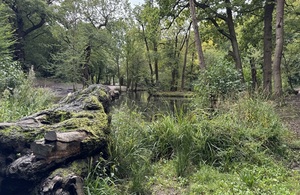Change for the Ching with new partnership river action plan
New collaborative action plan sets out projects to boost wildlife & water quality. Volunteers sought for forthcoming community river restoration projects

River Ching through Highams Park
An urban watercourse that flows from Essex to north London hopes to reap the environmental benefits of an ambitious partnership project to revitalise the river.
The Ching Brook, known locally as the River Ching or simply ‘the Ching’, originates as a small stream in Epping Forest and flows for approximately 10km through, and into, the River Lea.
As is the case with all north London rivers, the watercourse - and the wildlife that depend on it - suffers from its heavily modified nature. There are multiple weirs, structures, culverts, and stretches of concrete channel throughout the catchment and in places the river has been artificially straightened, widened, and deepened.
Water quality in the river is adversely affected due to household misconnections, sewage pollution, road run-off, rural sources and from nearby commercial activities.
To address these complex issues, the Ching Action Plan (London Lea Catchment Partnership (arcgis.com)) has been produced by the Environment Agency in partnership with the London Borough of Waltham Forest, Ching Action Group, City of London Corporation (Epping Forest), Ching Working Group, and the London Lea Catchment Partnership, hosted by Thames 21.
Lewis Elmes, Environment Agency Catchment Co-ordinator, said:
Our rivers are havens for wildlife and highly valued by local communities and visitors alike. Restoring them can bring huge benefits for nature, water quality and the local environment.
We are looking forward to working with our partners and enthusiastic volunteer groups on such an important and rewarding series of projects and are considering a number of funding opportunities to begin this work.
The future of the Ching depends on collective action and this partnership plan is a welcome step towards addressing the many pressures that this river faces.
The collaborative strategy identifies 27 improvement projects along the Ching which will provide significant benefits for both the local environment and communities living close to the river.
These include river channel restoration, tackling pollution from surface water outfalls, fish passes, pollution screens, installation of river telemetry and wildlife habitat improvement schemes.
Further projects identified will also enhance important community assets and help to improve people’s quality of life.
Janet Laban, Joint Lead at the Ching Action Group, said:
The Ching Action Plan provides the strategic framework we need to succeed in improving the River Ching for wildlife and people.
Citizen Scientists from the Ching Action Group have identified some pollution hotspots which the Ching Action Plan will help to address. We look forward to demonstrating the improvement in water quality and biodiversity that should result from the implementation of this plan.
We look forward to working together for a healthy river with abundant biodiversity.
Chris Coode, Thames21’s CEO, said:
We are very pleased to support this collaborative initiative, which will help to transform the River Ching into a thriving habitat for wildlife and a source of pride for the local community.
By working in partnership with communities we aim to foster a sense of ownership and stewardship that is essential for sustaining this river improvement over the longer term.
The initiative will not only help to improve biodiversity in our rivers but will also tackle challenges such as sewage pollution and flooding, which is becoming more frequent due to the climate emergency.
Ben Murphy, Chairman of the City of London Corporation’s Epping Forest and Commons Committee, said:
The River Ching is home to a wide range of wildlife and plays an important role in the wider ecosystem in Epping Forest, as the ‘green lungs of London’.
This plan will deliver many benefits, improving not only the water quality and habitats for invertebrates, fish and birds, but also helping to restore biodiversity, reduce pollution, and combat the effects of climate change across the more urban areas of Epping Forest and beyond.
Cllr Clyde Loakes MBE, Deputy Leader and Cabinet Member for Climate and Air Quality said:
We are delighted to be partnering with the Environment Agency and dedicated local organisations to improve waterways and boost biodiversity along the River Ching.
The Ching stretches for around 10 kilometres through the borough and this exciting initiative will improve vital habitats, boost water quality, and cut pollution. It’s also yet another example of local residents literally rolling up their sleeves to take positive climate and biodiversity action in their neighbourhood.
We already have a fantastic record in protecting and enhancing our local waterways. In 2017 we played a vital role in creating the largest urban wetlands nature reserve in Europe - Walthamstow Wetlands. Now its popularity with local people and flourishing wildlife serves as a blueprint for similar projects across the capital.
Supporting and enhancing green and blue spaces in the borough is part of our Mission Waltham Forest commitment to tackle the climate crisis, work towards net-zero in carbon and improve biodiversity.
Throughout the summer, all partners have been working hard to prioritise the key projects in the Ching Action Plan and will soon be calling on local volunteers to get involved in activities to help revitalise the river.
To have your say on the Action Plan or to register your interest in forthcoming volunteer opportunities, please email: [email protected]